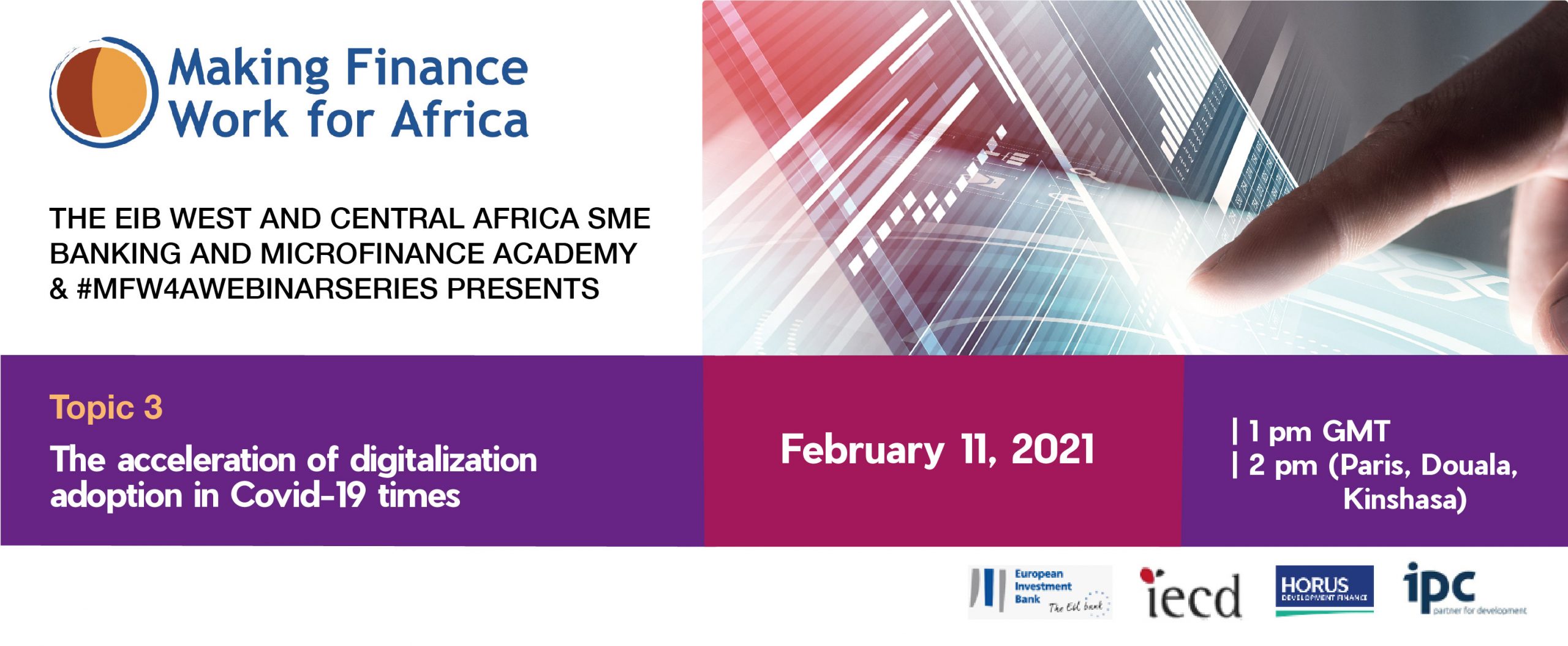The EIB West and Central Africa SME Banking and Microfinance Academy 2020-2021
Webinar series Topic 3: The acceleration of digitalization adoption in covid-19 times
11 Février 2021, 01 pm (Abidjan) / 02 pm (Cotonou, Paris, Frankfurt, Douala, Kinshasa)
CONCEPT NOTE
Introduction and background
Making Finance Work For Africa (MFW4A) and the IPC, Horus and IECD Consortium, within the context of the European Investment Bank (EIB) TA Financial sector programme for West and Central Africa are hosting a series of four (4) webinars for banks and microfinance institutions of these two (2) sub regions. EIB’s mission is to support motions to:
- in line with regulatory requirements, and
- to continue business operations on a sound basis, proactively managing present and future challenges.
This concept note is related to the third webinar, which will cover topics around the
Acceleration of digitalisation and digital banking adoption since the covid-19 outbreak.
Prior to the pandemic, the digitalization of financial services was already evolving rapidly for over a decade, in particular thanks to the rise of FinTech companies, Mobile Network Operators (MNO) offering innovative digital products, and also the augmentation of e-commerce. Also, the traditional banks and microfinance institutions were underway to catch the digitalization train, although at a mixed pace across the continent.
The Covid 19 crisis has led businesses in general and financial institutions in particular to speed up the adoption of digital solutions, so as to reduce physical contacts between their staff and their clients but also to cut costs in a context of reduced business volumes, interest rates and, in case of the lenders, increased credit risk. This process is being accompanied to various degrees by measures taken by regulators to promote digital payment transactions and services, workforce virtualization, etc.
Especially financial institutions have been under pressure to implement digital solutions much swifter than this would have been the case under normal circumstances, sometimes reducing their planning horizon from 2-3 years to just 3-6 months. They have done so by adopting measures such as using simple technological solutions (“plug and play”), setting up special tasks forces, cutting paper work, cooperating with regulators, etc. At the same time, successful FIs managed to put their clients at the center of their solutions, e.g. by enabling their front desk employees to spend less time for paper work and more time with clients and providing information and knowledge to clients to find digital solutions for themselves.
A particular aspect of the digital economy is that solutions can be used to increase financial inclusion (of persons having no bank accounts) and to create and intensify economic links (such as the digital platform of Twiga Food in Kenya which is linking food producers (small farmers) to retailers).
In this context, financial institutions and other participants are invited to this webinar to share their perspective.
The webinar will focus on the following issues:
- How has the COVID 19 crisis accelerated the implementation of digital solutions for the provision of financial services? How was traditional project planning shortened? With which challenges, risks and results and which were the lessons learnt?
- How have financial institutions started to prepare for the “new economy” triggered by the increasing spread of digital solutions? Notably: How are client adoption of digital channels and trust promoted? How are financial institutions providing useful information and knowledge to their clients? How is the emergence of e-commerce promoted?
- How are financial institutions positioning themselves in the digital landscape to compete or cooperate with new players (FinTech, MNOs) and increase financial inclusion?
Expected outcomes
Participants should gain valuable insights on:
- how some successful financial institutions managed to cut time in the process of implementing digital financial services and yet maintained an adequate level of security and trust.
- how important players in the region are positioning themselves with solutions specifically to increase financial inclusion, promote digital financial transactions, and also exchange information and knowledge useful for them and for their clients.
Event format and audience
The audience will consist of middle and senior managers from financial institutions and development finance institutions operating in West & Central Africa.
At the end of the webinar, key takeaways will be summarized in a post-event report and shared with participants and other stakeholders within the African financial ecosystem. A digital version will also be posted on MFW4A portal for public dissemination.
Tentative speakers
Moderator: Hugues Kamewe, MFW4A (m) & André Oertel (Horus Development Finance) (m)
Introductory words: EIB regional office representative, Senegal (Ramon Ynaraja)
Introductory words: EIB regional office representative, Senegal (Ramon Ynaraja)
Tentative panellists:
- Christopher Kansanba, Digitization consultant (PCES, Ghana)
- Olivier Bailly-Béchet, CEO, Advans Ghana
- Yann Dumontheil (CEO) (m) / Willy Tchiengue (Deputy CEO)(m), YUP Management (Société Générale), Sénégal
Other planned webinars
- Gender finance as opportunity in crisis times.
Contact
MFW4A: Hugues Kamewe IPC GmbH: Edwige Takassi
Email: h.kamewe-tsafack@afdb.org Email : takassi@ipcgmbh.com




